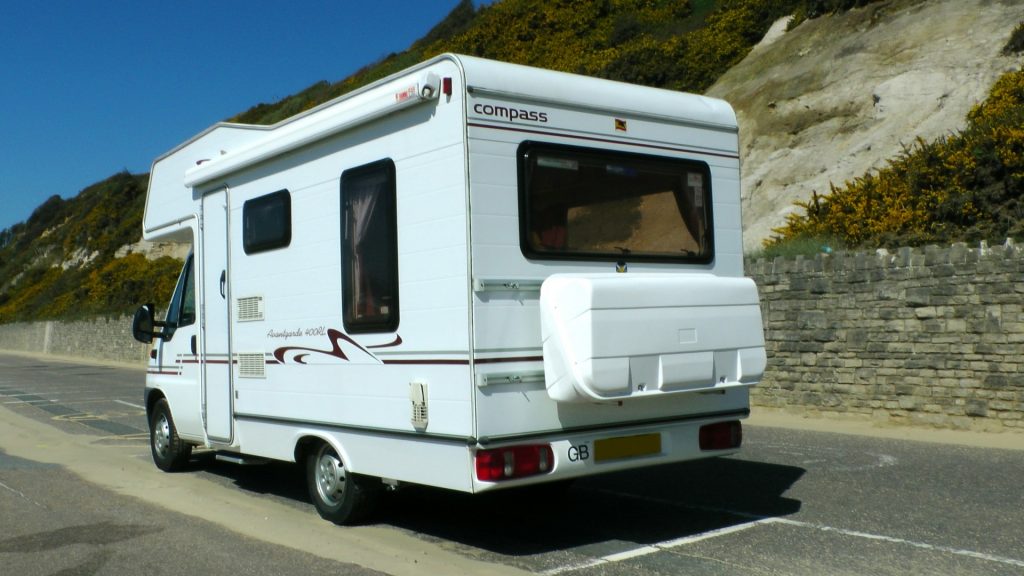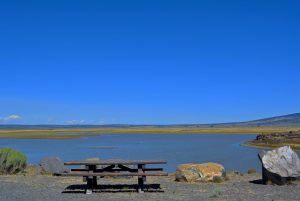The cost of RVing is still a bargain when compared to paying for air travel vacations. In a recent study that looked at the cost of RV vacations, the Recreational Vehicle Industry of America revealed that:
“RV travel is 23 to 59% less expensive than other types of vacations, for a family of four that owns an RV. For an “empty-nester” couple traveling by RV, savings were 11 to 46%. “

By learning how to save money on RV vacations you’ll have even more money left over for entertainment and fun activities with your travel mates.
1. Join a camping club.
Many camping clubs exist to help you save on campground fees. Some cost thousands of dollars to join in order to be a part of their “exclusive” membership opportunities, but that’s not exactly saving you any money, especially if you’re casual RVers.
For RVers who don’t want to stick to one particular brand of RV parks, a low-cost camping club like Boondockers Welcome will connect you with free places to camp. Passport America can save you 50% off participating campgrounds around the U.S., Canada, and Mexico.
You’ll find a wide variety of amenities and accommodations at each park. For peace of mind, head over to campgroundreviews.com to get fellow campers’ opinions about Passport America parks that you’re thinking of visiting.
2. Learn how to dry camp.
Dry camping is a frugal RVers preferred way to save money on camping fees. Learning how to camp without hookups takes a little bit of practice, such as: knowing how many showers you can take with your on-board water supply, and how often you’ll need to empty your tanks.
But learning how to camp off-grid without hookups can literally save you thousands of dollars in a year’s worth of camping fees. Talk to RVers in the iRV2 Boondocking Forum for dry camping tips.

Chickahominy Reservoir in Eastern Oregon. Photo via Flickr
3. Camp on the outskirts.
The greater distance you put between your campsite and popular family camping destinations like Yosemite National Park or the California Coast, the more you’ll save.
Consider staying at a location that’s an easy day trip distance away from your home base. You’ll find cheap RV park rates when compared to staying in the middle of the action, and it will probably be a whole lot quieter too.
The more you go RVing the more you’ll learn money-saving tips that work well for your lifestyle. If you have already discovered budgeting tips that work for you, join the discussion in our RVing on a Budget Discussion Forum topic.

If you’re into “free” or low-cost, join the camping group HarvestHosts.com. You get to stay for free at wineries, farms, museums, etc. at no charge but there are usually no hookups. A few rules apply, such as one-night stays only, you must be self-contained, call ahead 24 hours, spend some money at the host’s place of business and most of all, be courteous. You can find more information at their website and the cost to join is only $40 per year. Best of all, you get to meet some interesting people and see fun places. Check it out!!
We do Boondock but not at someone’s home or property as we cannot do the same for them as we live in an Apartment. We prefer open land and we are totally self-contained, but have to dump about every 5-6 days so well need a place close by to dump the tanks and Fill up with Fresh Water. I don’t think well have much of a problem this spring as were heading to Alaska this year taking from middle of May to Middle of July by going up Alaska Hwy and coming back Hwy 37 to Terrace then over to Rupert then back to Pr. George then down 97 to #1 and home to New Westminster, BC
Have not tried boondocking yet. Is my goal to try this year. WIth all the traveling do you use a generator? How do you find places to get fresh water and dump?
Bill and Jo
With frugal water use we can go 2 weeks, then we pay a night at a park to dump, refill water, long shower, and do laundry. Works great for us.
I’m sorry to say that my wife is a heavy water user both via tap and toilet. When I travelled 26000 miles on my own with a Porta Potti I had to empty it every 6-7 days no longer than that plus my grey water I could go a month or more with just me in the Van. I sponged bathed and dry washed my hair every 2nd day but washed my hair once a week with water to get a thorough clean.
My wife insists on taking a 6 gallon shower at least once a week, that 6 gallons would last me 6 weeks but I bought bottled water for drinking and I still boiled it first before drinking it.
Peter
We are not extreme dry dockers, but a favorite way to save money is to stay in unimproved campsites in National Wilderness and Forest areas. Yes , pit toilets (clean unless an idiot decides to mess it up), probably not water in the area, but you may get lucky! Most of the campers consider the camps “their secret”. and hope you won”t ruin their little paradise. We have a few and only tell people we like. If you have a Golden Age Passport you really score. Half price! Worth it for National Parks alone. City and county parks are a good bet too.
I just wanted to thank you for these tips when it comes to RV camping. You mentioned that it could be good to camp on the outskirts, especially if it’s a lot quieter and cheaper. This seems like a good way for you to also walk around more often and enjoy the weather as you are traveling from place to place.
(I just posted this at the article “Six States that Allow Overnight Parking at Rest Areas,” but I thought it was more relevant posted here.)
For free camping, I try to camp in National Forests using their free Motor Vehicle Use Map (MVUM) and also on the BLM lands in western states.
FreeCampsites.net has a great, free mapping tool for locating all kinds of free campsites including free county parks I would have never known about. I use FreeCampsites.net a lot.
Walmart is an overnight option if necessary and where allowed.
In my early 60’s, I am a 3 1/2 year full-time boondocker or dry camper in a 23 foot motorhome with four 100 watt semi-flexible solar panels taped with 2 inch wide Eternabond tape to the fiberglass roof (instead of screws) to run my 17 inch laptop, 23 inch TV and charge the 2 AGM house batteries. A 2000 watt Magnum inverter supplies the electrical outlets with AC power, and an onboard generator usually powers the 1350 watt microwave or 1100 watt toaster as the generator charges the house batteries.
Having solar is probably of paramount priority to boondocking. Semi-flexible solar panels only weigh 4 lbs each, compared to 40 lbs for a rigid panel.
Although I selected the 100 watt, semi-flexible solar panels from Magma-Solar-USA on eBay because of their high grade UV wires and extra-large junction box, this solar install was done by John Palmer of palmerenergysystems.com in Mayo, FL, east of Tallahassie. He is of excellent reputation in the eastern U.S., having done over 4000 solar installs and that was as of 2 1/2 years ago. He makes some of his own cables using the thick, 2 ought welder’s cable for the batteries to inverter area.
Basically, every 10 to 14 days, I visit a dump station to dump the tanks (using RVDumpsites.net or Sanidumps.com), water up and dispose of trash.
Then I shop for groceries (usually at Walmart), get some diesel and sometimes pick up any mail shipments from my mail forwarding service, Escapees.com, using either USPS General Delivery, a UPS Customer Center (Hold for Pickup) or a FedEx facility. Or I may receive package shipments directly from companies (thus bypassing the Escapees’ forwarding costs) after asking the particular company which shipper (USPS, UPS or FedEx) they use.
Other than that, my free campsites can’t be of mud and preferably need to be of say at least 500 square feet, reasonably level and impervious to rain (either dry or of solid rock/gravel, or pine needle covered,) with adequate full sun for solar, as well as having internet and TV channel signals (hills or high areas are the best for reception).
My wife and I want to try going camping in an RV this summer, so thanks for sharing this. I like your point about camping away from popular sites. This sounds like a good way to avoid crowds, so we’ll definitely consider this.